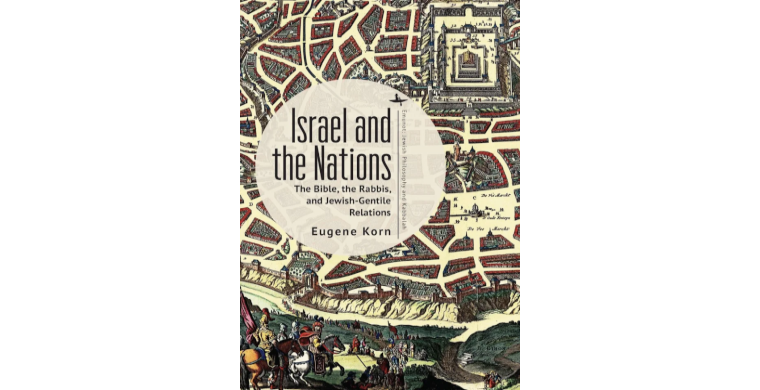Israel and the Nations: The Bible, the Rabbis, and Jewish-Gentile Relations
By Eugene Korn
Academic Studies Press (2023)
Reviewed by Gerald McDermott
Most Christians are unaware of the sordid Christian history of persecuting Jews. From the fourth through the twentieth centuries, Christians killed more than one million Jews because (they assumed) they were "Christ-killers"--despite the fact that later Jews had nothing to do with the crucifixion, and most Jews in Jesus' day loved him (it was only the temple authorities who hated him)--before the Holocaust that killed six million Jews. That was directed by the most Christianized country in history, where a plurality--perhaps even majority--of Christians supported the Nazi regime in one way or another.
Almost every Jew I know has family members who were murdered in the Holocaust. It is no wonder that when Jews hear the words "Christ" or "gospel" or "church" or "Christianity," they think of Auschwitz and imagine the cries of their own family.
It is a wonder that Jews today are willing to talk theology with Christians or speak up on behalf of persecuted Christians. Eugene Korn is a distinguished Jewish theologian who has been doing both of these things for decades. Now he has published an elegantly-written collection of theological essays (Israel and the Nations: The Bible, the Rabbis, and Jewish-Gentile Relations) on how Jews should relate to the world, especially to Christians. This short review cannot do justice to the beauty and profundity of this book. But I will isolate four themes.
The first is something very few Christians have ever heard--what Jews think of Christians. Korn says it has depended on Jewish experience of Christians in their neighborhood, so to speak. In the first two centuries of Christianity, Jews considered Jesus-followers to be heretics; in the Middle Ages when Jews lived in Christian Europe and depended on the Christian economy, they did not think Christianity was idolatry (beyond the pale) but still illegitimate for a Jew; in the late Middle Ages and early modernity, Jews thought Christianity was legitimate for Gentiles; from the 17th through the 20th centuries, many rabbis said Christianity was a positive force in the world because it taught the God of Israel as the true God, revelation, and the Noahide commandments.
For much of the last two millennia, rabbis have taught that Christians can be "righteous Gentiles" and have a "share in the world to come" (the new heavens and earth) if they are faithful to the seven commandments given to Noah for the world at large: prohibitions of murder, theft, sexual wildness, idolatry, eating the limb of a live animal (meaning cruelty more generally), and blasphemy, plus the establishment of courts to enforce these laws.
A second theme is the hard lives Jews have lived during the long Christian era when they were the objects of discrimination and atrocity at the hands of Christians.
"Today," Korn laments, "we Jews are a traumatized people, a nation suffering from battered wife syndrome." The wounds inflicted by Rome, the Church, Tsars, the Nazis, the Communists, and now radical Muslims are still raw. They have convinced many Jews that the only way to stay safe is to isolate themselves from the world. "It seems that whenever Jews engaged with the world, Jewish blood ran in the streets."
But then, third, the Roman Catholic Church launched "a Copernican Revolution" in Christian theology about the Jewish people at Vatican II. The council document Nostra Aetate (1965) denounced the traditional Catholic (and Protestant) teaching that Jews are "Christ-killers" and that God put an end to his covenant with the Jewish people, transferring its blessings to the Gentile Church. It recognized God's promise that the Jewish people will be YHWH's Chosen Nation as long as the sun stands in the sky by day and the moon and stars by night (Jer 31:35-36). Most mainline Protestant churches have followed Rome on this, and now more and more scholars are doing the same in organizations like the Society for Post-Supersessionist Theology.
A fourth theme in this deeply enlightening book is that Jews need to recover their divine calling to be a light to the nations (Is 49:6). Since Abraham, says Korn, they have been called to be a priestly people. A priest points the world to the true God, and Israel as a nation has been doing that for four millennia. Persecution has caused Jews to go inward, but they must remember their calling at Sinai--to purify themselves by the Mosaic covenant so that they can call the Gentiles to the Noahic covenant and thereby, we might say, save their souls.
Today, Korn insists, Jews must lock arms with Christians to fight common enemies--relativism and secularism on the left, and radical Islamist violence on the right. Against the recent devaluation of human nature, Jews and Christians must teach the sanctity of human life:
Physicalism, relativism, and moral utilitarianism have all become fashionable, if not dominant, in contemporary academia and high culture. These ideologies promote the idea that human life has no intrinsic value or dignity to be respected and protected. In other words, they forcefully reject the starting points of both Jewish and Christian ethics, namely that each person is created in God's image, and hence that each person is intrinsically sacred.
Rabbi Korn has led other Jews to condemn radical Jewish attacks on Christians and their holy places in Israel. He has also worked publicly to defend Christians against persecution around the world.
At a time when antisemitism is on the rebound and Jews like Rabbi Korn are fighting to defend Christians, it is high time we listened to voices like his. His new book is a great place to start.
Gerald McDermott teaches at Jerusalem Seminary and the Reformed Episcopal Seminary (ACNA) in Philadelphia. His new book is A New History of Redemption: The Work of Jesus the Messiah Through the Millennia (Baker Academic, April 2024).














